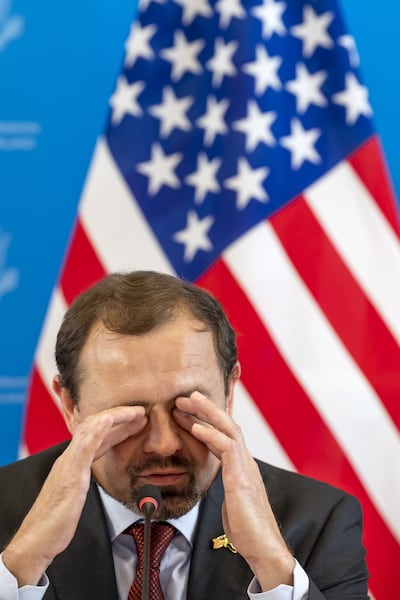A proposal to install a government in Sudan's capital Khartoum to challenge the nation's military-backed and internationally recognised administration could, if it becomes a reality, accentuate territorial divisions 20 months into a devastating civil war between the army and a powerful paramilitary, analysts say.
The paramilitary Rapid Support Forces, which has been battling the army for control of the vast Afro-Arab nation, says it is willing to co-operate with a government headquartered in the sprawling capital, most of which the RSF controls, together with vast areas in the west and centre of the country.
The RSF, under Gen Mohamed Dagalo, insists it has no current links to the civilian politicians behind the proposed government and says it would work with but not control it.
“We in the RSF will only carry out the military and security role, but governing will be undertaken by civilian forces independently,” it said in a statement last weekend.

US special envoy to Sudan Tom Perriello was also not enthused by the idea of a government to rival the one in Port Sudan, saying it will constitute a step backwards.
“There are different things it could be, all of them bad, from government-in-exile to 'we are the government' to 'we are the government over the territory that we stand in',” he told reporters in London.
Behind the idea of the new government is a coterie of civilian politicians and rebel groups at odds with Sudan's de facto leader, army chief Gen Abdel Fattah Al Burhan, and his government in Port Sudan on the Red Sea east of Khartoum. The government moved there last year from the capital.
Significantly, Taqadom, the acronym for a coalition of civilian parties also at odds with Gen Al Burhan, has distanced itself from the proposal to form a rival government in Khartoum.
However, the analysts who spoke to The National suspect the RSF was behind the idea of installing a government in Khartoum and that it intends to use it to gain a measure of legitimacy at home and abroad, as the party open to negotiating an end to the war.
“The RSF has suffered a series of battlefield defeats and it feels isolated at a time when its narrative of democracy and inclusion in a postwar Sudan has ceased to resonate with most Sudanese or foreign powers,” said prominent Sudanese analyst Osman Al Mirghany.
“However, if regional or international parties accord it recognition, we will have an additional problem to deal with. If that happens, it will usher in conditions similar to those prevailing in Libya, where there are rival governments in the east and the west."

Three of the politicians behind the proposal are former members of the Sovereign Council led by Gen Al Burhan. They and others supporting the proposed instalment of a “peace government” say the rationale is to compensate for Gen Al Burhan's refusal to negotiate with the RSF to end the fighting.
The war in Sudan broke out when a power struggle between the army and the RSF boiled over after months of tension. The army had been refusing to negotiate with the RSF after a string of failed ceasefires brokered by Saudi Arabia and the US in the war's early days. It insists on fighting until victory is achieved.
“The group [government] in Port Sudan does not aim for peace and refuses all initiatives to end the war,” said former Sovereign Council member Mohammed Al Taishi, an outspoken critic of the military who is tipped to head the proposed government.
“The Port Sudan authority is using its assumed authority … to divide the country through illegal unilateral moves,” said another former Sovereign Council member, Al Hadi Idris, citing recent moves to bring in new banknotes and hold school exams in army-controlled regions.

Tens of thousands have been killed and more than 10 million displaced as a result of the war, creating a massive humanitarian crisis in which 26 million – more than half the population – are facing acute hunger, with some close to famine.
Both parties in the war are accused by the UN and western rights groups of committing war crimes.
“The idea of creating a rival government in Khartoum is a reflection of the despair felt by many over the army's unwillingness to end the war through negotiations,” said Abdel Baqy Jibarah, a Sudanese analyst. “But it can serve as a source of pressure on the army to resume negotiations.
“But, like the Port Sudan government, the RSF-controlled one they plan to set up in Khartoum will not manage to offer adequate services and security to the Sudanese people,” he said.
For now, however, the danger posed by two separate governments in Sudan is a source of serious alarm.
“This step, if it actually happens, will constitute a real threat to Sudan's unity and divide the country to rival spheres of influence that will stand in the way of any attempt to achieve national reconciliation,” said Erwah Al Sadeq, a prominent politician who is a member of the politburo of the Forces of Freedom and Change, a coalition of civilian groups that emerged after dictator Omar Al Bashir's ousting nearly five years ago.
Al Shafie Ahmed reporting from Kampala, Uganda

